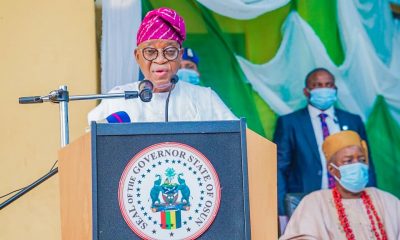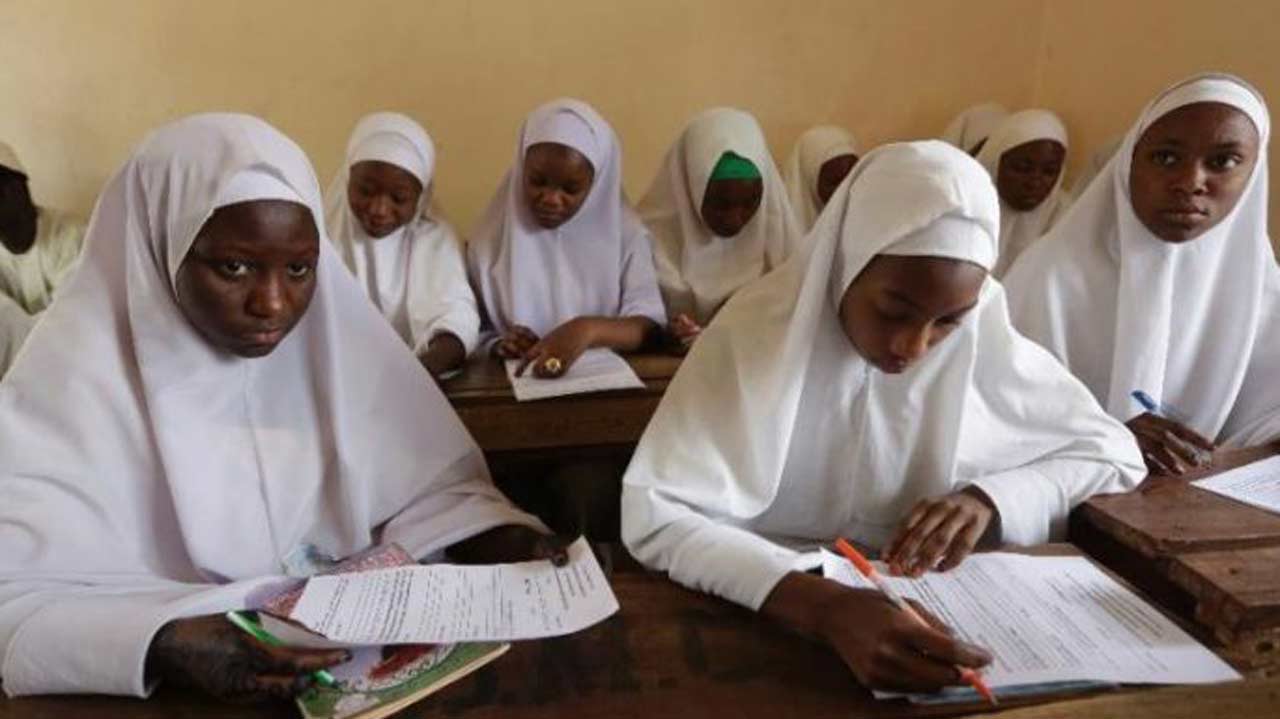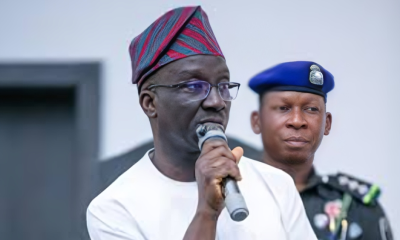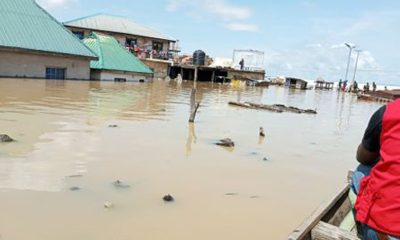OPINION
Oyetola and the a ‘O M’erin J’oba’ Choristers
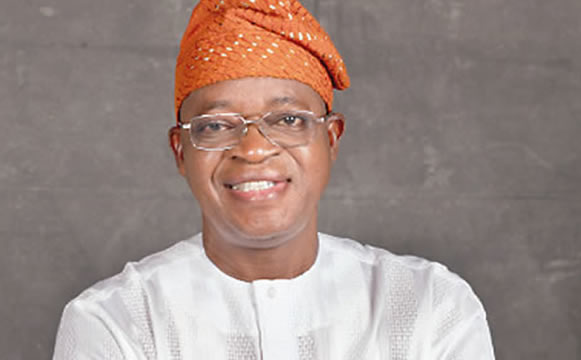
By Semiu Okanlawon
Permit me to tickle you with the Yoruba folklore, A o m’erin j’oba (we’ll make the elephant king), which in history has no parallel in the apt dramatisation of deceit, wickedness and fraud, usually woven around fame and positions of influence and affluence.
In the a o m’erin j’oba tragi-comedy, the elephant, in its obvious majestic size and shape, was led on by a band of deceivers and manipulators all garbed in attires of praise-singers.
Sadly, they had a sinister motive. Those who chorused its praises and assured the elephant of its impending ‘coronation’, had dug its grave where they planned to ditch it once they succeeded in cajoling it to follow them to the venue of the ‘coronation’ ceremony.
The grave was decorated with very attractive velvet materials. And so they went for the elephant with singing and dancing. Totally oblivious of the evil plots by its praise-singers, the elephant danced on its way to the venue thinking it was its day of honour.
Alas! On getting to the ‘coronation’ venue, where a beautifully decorated royal chair had been placed, the elephant sank with all its weight into the grave, while the praise-singers went their different paths; some of them jubilating.
Who is the elephant here?
In the three years that Governor Gboyega Oyetola has held sway in Osun, I don’t think I have been taken aback by anything else more than the manner he has left himself to the whims and manipulative caprices of a band around him.
I learnt before now that occupiers of offices are often hostages of the intriguing manipulation of ‘smooth operators.” However, not in anyone’s wildest imaginations could it have been speculated that a man of such immense power could become so weak and seemingly hypnotised to this point of self-immolation.
In all things, I have continued to ruminate on how successful those who have goaded the governor on this misadventure expected their venture to be. This was the crux of my discussions with him in December 2019, during which I asked whether he thought it possible to extricate himself from whatever happened under the Aregbesola administration by virtue of his position at the time.
Assuming, without conceding, that Aregbesola’s administration was spendthrift or took certain decisions bordering on the finances of the state, including loans, salary issues, infrastructure financing and virtually every general matter, is it possible for Oyetola to be seen as an outsider to what transpired? As a functionary in that administration, I knew ab initio that any attempt to present Aregbesola as evil was going to hurt Oyetola and his administration more than it would, Aregbesola.
With Oyetola’s emergence, no one expected any lull in the advancement of the “State of the Virtuous” in education, job creation, infrastructure rebirth, security, and above all, value re-orientation that hallmarked the administration where he served as the Chief of Staff and as a matter of fact, a major policy egghead.
But rather than busy himself with these lofty objectives for which continuity would be a preference for public good, a vein, inglorious and totally unnecessary attempt at “removing the hands of Aregbesola” from the politics of Osun was elevated to the level of state objective. If you cannot key into that objective, you certainly cannot matter either in government or the party.
I have asked myself what were these objectives meant to achieve.
In December 2019, I returned from Europe after about six weeks. During my stay, I was getting bombarded from Nigeria and my Ward in Iwo East Local Council Development Area with reports of surreptitious moves by some people, propped up and goaded on by some appointees of the governor, to reorder some political arrangements at the ward levels.
Of course, given the roles I had played previously in the election of the governor, especially in the face of the total rejection of his candidature, people from my ward and local government were becoming apprehensive. Simply put, the grassroots ‘soldiers’ of the All Progressives Congress (APC) were already suspicious that something capable of destroying the fabric of the party was going on at the ward level across the State. They needed information, assurances that the party was not coming into the hands of those who would destroy it. They needed to bring their anxieties to me. But because I had travelled for an international conference and used the opportunity for some rest as well, they kept bombarding me with messages that our party was witnessing something very sinister, the type that could ignite an implosion if nothing was done.
Once back in Nigeria, I immediately sought audience with the governor. I needed to confirm if he was in the know of some underground moves to replace the party structures at all levels with those who claimed to be Ileri Oluwa leaders.
The governor denied knowledge of this but I told him that he needed to investigate it. Not convinced that he was unaware of the discriminatory moves and ill-feelings already being created, I went ahead to tell him that any attempt to cast Aregbesola in the image of someone to be discarded was predictably going to blow in the face of everyone.
Three years down the line, not even the governor (if he wants to be sincere with himself) would deny that the anti-Aregbesola manipulations have been very perilous for the party and his administration. The scars are there.
Before I left his office that day in 2019, I asked him if Aregbesola offended him. Without giving him room for an answer, I went ahead to tell him that even if Ogbeni had offended him, he should consider himself already well compensated by God by his emergence as his successor. I made it clear to him that vindictiveness and leadership were alien to each other.
By my nature, training and calling, I am not a cheerleader. Late in 2011, I wrote a mail to Aregbesola. In that mail, I sought to have his understanding to grant me a concession to freely express contrary opinions to his stance on issues, especially if all other appointees did not want to contradict a governor. For me, those in positions such governorship need around them honest inputs and not cheerleading and praise-singing.
If there is one person who is a witness to my minority opinions before Ogbeni at that time, it should be Governor Oyetola. And I am quite sure he still remembers a few instances where, without sounding confrontational or insulting, I politely disagreed with Ogbeni on issues. On one or two occasions, I expected a sack. He never did.
The press interview I granted over the manner Oyetola’s appointees were going about the school reform was the plain truth and till date, remains unchanged.
Semiu Okanlawon, a former Special Adviser on Information and Strategy to the governor of the State of Osun, wrote from GRA, Osogbo.
OPINION
Advancing Nigeria’s Security Strategies through Unmanned Aerial Systems

By Patricia Amogu
In the face of Nigeria’s deepening security crisis, marked by terrorism, banditry, kidnapping, and communal violence, a glimmer of hope is on the horizon as homegrown security innovations gain momentum.These indigenous initiatives are gradually taking centre stage, lifting the spirits of millions and giving balance to the lives of many vulnerable and displaced communities across the country.
Recently, a groundbreaking collaboration between the Nigerian Military and Briech Unmanned Aerial Systems (UAS) birthed the first and largest indigenous attack drones and bomb systems in Nigeria and Africa. Unveiled at the company’s Abuja headquarters, this cutting-edge technology is being hailed by stakeholders as a potential game changer in the fight against insurgency and organised crime.According to Mr Bright Echefu, Chairman of EIB Group and founder of Briech UAS, the innovation became imperative as extremist groups like Boko Haram and ISWAP increasingly weaponised commercial drones to spy on troops, coordinate ambushes, and conduct aerial attacks.“Our enemies are adapting fast; they are using off-the-shelf drones to launch crude but deadly strikes.“We cannot afford to rely on outdated tools anymore,” he said.Echefu said that as Nigeria continued to invest in indigenous defense manufacturing, the country might potentially become a player in defence and security issues of many countries.Of interest, the European Union Agency for Asylum (EUAA) characterises Nigeria’s security situation as complex and deteriorating, citing armed banditry and widespread kidnappings as the leading causes of instability.Available data indicates that in 2023 alone, more than 75 per cent of conflict-related deaths were reported in the northern region.Attacks by Islamist groups, counter-insurgency operations, separatist tensions, and herder-farmer clashes continue to fuel widespread displacement and humanitarian distress.The North-East, in particular, has seen entire communities fleeing for safety as armed groups impose levies and destroy essential infrastructure.According to EUAA figures, more than 21,000 Nigerians applied for asylum in the EU+ between January 2023 and March 2024, signaling a troubling trend of migration driven by insecurity.A security expert said Briech UAS’s new technology promised to enhance Nigeria’s ability to detect, deter, and respond to security threats in real-time.“For the fast rising tech company, some features stand out an advanced surveillance and thermal imaging for wide-area monitoring, real-time intelligence gathering to support on-ground tactical operations, rapid response capabilities to intercept or neutralise threats before escalation and cost-effective, scalable solutions for ongoing border and community surveillance“These drones also have potential applications beyond combat, such as disaster response, infrastructure inspection, and search-and-rescue efforts.“As traditional security methods struggle to match the speed and complexity of modern threats, indigenous technological solutions like Briech’s are increasingly vital.“The partnership with the Nigerian Army reflects a broader strategic shift—one that embraces innovation, local expertise, and adaptive warfare tactics to restore safety and rebuild public confidence.“As Briech UAS positions Nigeria at the forefront of drone-powered security innovation in Africa, citizens and stakeholders alike are watching with cautious optimism there is a dim light at the end of the tunnel,’’ he said.The Chief of Defence Staff (CDS), Gen. Christopher Musa, described the initiative as a significant step in Nigeria’s journey toward self-reliance in defence technology and national security enhancement.He said that the innovation was a game-changer in an era of complex and asymmetric security threats, emphasising the significance of producing local military solutions, especially in the face of global politics and procurement challenges.“These force multipliers will play a vital role in enhancing the operational effectiveness of our military, particularly in a world where global politics surrounding the procurement of advanced military hardware have become more intricate.’’The CDS said that countries that did not produce such solutions faced bureaucratic bottlenecks and diplomatic hurdles when acquiring the critical platforms.“We are facing such challenges directly, if you do not produce what you need, you will be at the mercy of others, even when you have the financial resources to acquire them,” he said.He said that the drones would help Nigeria respond swiftly to security challenges, cutting down on dependence on foreign equipment.In his submission at the unveiling, Gov. Caleb Mutfwang of Plateau said that homegrown solutions had great impact for the country’s security needs.He emphasised on the importance of protecting national sovereignty and safeguarding the country from activities of non-state actors.“We have made a mistake by allowing non-state actors to acquire capabilities that rival those of state actors,” Mutfwang said.He said that Plateau was actively working with local manufacturers like Briech UAS, with drones already deployed in the state, improving the effectiveness of security operations.Deserving no less attention, Echefu, during a media tour of the firm’s security facilities, said that through innovation and advanced technology, Nigeria could handle its security challenges.According to him, the company provides intelligence support for Nigeria’s security agencies though digital forensics, tracking and critical assets as well as supply of combat and surveillance drones.He said it manufactured Arginin Reconnaissance Drones configured for high-performance reconnaissance and surveillance missions.“The company also produces Arsenio BFLY and Xander Reconnaissance drones among other super precise attack drones that can navigate difficult environments.“These systems are crucial in combating insurgent groups, adopting different drones for reconnaissance and attack missions.“The primary purpose was to demonstrate the capabilities of the security apparatus deployed to fight insurgency, its potential is to enhance counter-insurgency operations and mitigate the threats posed by insurgent groups.“The significance of this effort lies in stressing the potential of the equipment to enhance intelligence, surveillance, and reconnaissance (ISR) capabilities.’’Echefu said the tools would also improve force protection and reduce troop casualties by minimising reliance on manned reconnaissance missions.According to him, the use of commercial drones by insurgent groups presents significant challenges for security forces.“To address this, the security apparatus is leveraging technologies like drone detection and jamming systems, improved intelligence gathering, and counter-drone systems.“The system will generate insights from the collected data, allowing for better decision-making and improved resource allocation.“This system will provide at-a-glance dashboards showing the status and location of monitored items, including parameters like satellite imagery and intelligence gathering capabilities to support security agencies,’’ he said.Echefu said with the right support and increased investment, indigenous companies had the capacity to provide the needed logistics support to the military in the fight against insecurity.He acknowledged the support from government to the indigenous security firms and called for more policies to foster Nigerian companies’ growth, especially those in defence and security sector.“I can tell you that I am not the only one that is into supporting the various sectors, by local activities, local productions; there is a lot going on. People are even producing tractors in Nigeria now.“Nigeria has 100 per cent capacity right now to end this urgency with the number of local companies that are investing heavily.“The Nigerian military strongly supports local manufacturers through research collaboration and support,” Echefu said.Security analysts are of the view that more states should embrace drones for comprehensive surveillance, especially for hard-to-reach areas.They say collaboration between the Nigerian Military and Briech will boost cross-border counter-terrorism operations and strengthen internal control over weapons systems and logistics. (NAN)OPINION
Akpabio-Akpoti Senate Judgment and the Contrived Ambiguity

By Simbo Olorunfemi
Much has been made of Justice Binta Nyako’s judgement in the case of Senator Natasha Akpoti-Uduaghan v The Clerk of the National Assembly of the Federal Republic of Nigeria and others. Many have argued that it is the ambiguity, non-definitive, and non-declaratory nature of the ‘judgment’ that has led to the confusion that has since then ensued, culminating in the embarrassing public spectacle we witnessed a few days ago.
Having now taken time to review the full judgment, not just the extracts that first came out, I have come to a different conclusion on the matter. Rather, I am of the opinion that what we are dealing with is a case of contrived ambiguity and manufactured confusion. A dispassionate reading can only lead one willing to learn to clarity. There is nothing ambiguous or confusing in that judgment.All that is needed is to situate the judgment in the proper context of the circumstances that led to the cause of action, pay attention to the reliefs sought by the plaintiff, bearing in mind that the Court is no Father Christmas, before reading the decisions of the court. That done, it becomes obvious that, but for a deliberate attempt at mischief, there is nothing that should have triggered the confusion that we have witnessed in the matter.Dial back to the very beginning. The senator had raised hell on the floor of the Senate about the reassignment of seats, insisting on speaking from a seat not assigned to her, while holding on to Order 10 of the Senate rules. Every effort, within and outside the chambers, to make her understand that while Order 10 offers her the privilege to speak at ‘anytime’, that privilege is itself contingent upon speaking from her assigned seat, in accordance with the rules.She not only refused to abide by the rules on the day, but she also followed up with a radio interview. A motion was subsequently moved by another senator, stating that his privilege had been breached, leading to the matter being referred to the Committee on Ethics and Privileges, which then invited her to appear before it. Rather than do so, she opted to approach the Court.She sought the court to protect her right to a fair hearing and privileges under Orders 9, 10, and 11, arguing that a combined reading of these orders ought to have served as cover for her actions on the floor of the Senate and protected her from being referred to the Ethics and Privileges Committee.In other words, her suit was virtually a carryover of her argument on the floor of the Senate, and subsequently in public fora, that by virtue of Order 10, she had a right to speak from wherever she chose. It is on the basis of, and around this, that she filed an action seeking six reliefs.It is instructive that the Court didn’t find merit in any of the reliefs she sought, thereby comprehensively ruling in favour of the Senate, asserting its rights to set its rules, discipline its members, and pointing out that the Senate President is vested with the right to assign and reassign seats. It also affirmed that members can only speak from assigned seats, and that it is within the rights and purview of the Senate to refer the senator to the Ethics and Privileges Committee.In the words of the court (CAPS mine for emphasis): “In the circumstances of this case, as rightly contended by the Defendants, an invitation to appear before an Ethics Committee of the Senate is a CLEAR MANIFESTATION OF PROCEDURAL FAIRNESS, NOT A BREACH OF IT. From a careful reading of the Originating Summons, there exists no allegation whatsoever to the effect that the Defendants contravened…statutory or constitutional provisions as the crux of this action is hinged solely on protection of parliamentary privilege on the floor of Senate. It cannot be the intendment of Section 36(1) of the 1999 Constitution that this Court has powers to entertain complaint against any and every discussions/written communication arising from plenary sessions of the 2nd defendant. If it were the case, then this Honourable Court would know no rest.”It is safe to say that the Court resolved all the issues raised in favour of the Senate (even partly affirming the argument raised by the parliament in its preliminary objection on the lack of jurisdiction). Even on the matter of contempt filed by the Senate President on 5th May, seeking five reliefs, the Court, in protest of the 27th April satirical apology of the senator, found her guilty of contempt, fined and ordered her to issue a public apology.There is therefore no confusion, from the judgment as seen, that all the direct reliefs sought by the senator were denied and orders to that effect expressly made.Justice Binta Nyako might have simply wrapped it up, but it is my opinion that, having reviewed the rules of the Senate and out of consideration for the constituents in Kogi State, she then ventured further to offer an opinion on the extensive powers of the Senate, which allows it to suspend a member ad infinitum. Bear in mind that there was no relief directly sought in this regard. The Court only decided to widen the scope of consideration, and in that light, the Justice argued that “to make a LAW THAT HAS NO END IS EXCESSIVE and cannot be the intendment of the law,” thus imploring the Senate to EXERCISE ITS POWER to review the rules and recall the senator.These are the words of Justice Binta Nyako in that regard. (CAPS mine for emphasis): “On the issue of denial of the Plaintiff to the representation of her Senatorial District without inspiring the function of the NASS, I will give and say due to the gravity of the issue, I have read in its entirety, the Senate Rules under which the Plaintiff was suspended, thus denying the representation of her Senatorial District.“I believe that the constitution, Legislative House (Powers & Privileges) Act, nor the Senate Rules will not intend for that to happen. I have read with interest, Chapter ix (8) of the Senate Rules and Section 14(2) of the Legislative House (Powers & privileges) Act ix (8) allows the Senate to suspend a senator until a time determined by the Senate ad infinitum while S.14(2) allows for suspension of a member (Senator) in similar terms, even without pay.“I do not think the constitution envisages this.“A Senator is expected to represent his people in either Legislative house for a specific number of days per session. If any suspension is UNWARRANTED, then I OPINE that the Act and the Senate Rules should also be specific and not live it at large. A suspension cannot exceed the requisite number of days the member should sit. The constitution says a legislative year is 181 days and the house should sit for this number of days. This makes it at least 36.2 weeks in a year, which is a session. To suspend a member for 6 months means suspension for 180 days and this is half the number of days the member is expected to sit in the House representing his people.“I do not think this is the intention of the framer of the law. To make a LAW THAT HAS NO END IS EXCESSIVE and cannot be the intendment of the law. I AM OF THE OPINION that the Senate has the POWER TO REVIEW this provision of the Senate Rules and even amend Section 14(2) of the Legislative Houses (Powers & Privileges) Act, both for being over-reaching. The Senate has the power to and I believe should recall the plaintiff and allow her to same time, represent the people who sent her there to represent them.”I believe that what the Court did was to, out of compassion, offer a lifeline to the senator, in realisation that this was a difficult situation. The court has clearly established the powers of the Senate and that it has not contravened its rules and the law in this instance. I believe that offering that opinion was the Court’s way of asking the Senate to temper justice with mercy.I believe that if that judgment had been accepted with a bit of contrition and humility, and there had not been the rush to foist a different interpretation on it, as is obvious to some of us who have read it, thereby reading into the decision of the court what was not there, we might not be where we are today. I believe a more diplomatic approach might have served as a lifeline for a rapprochement between the senator and the Senate.An apology to the Court, as ordered, and an apology to the Senate, as had been requested by the Senate, could have followed suit, and that would have offered an opportunity for a dignified closure to this phase of an embarrassingly mismanaged fight.I do not see how enlisting the services of social media influencers and full-time activists can help turn a recommendation into an order. There is a time for everything. No matter how far one might have gone in a particular direction, there is always an opportunity to retreat, rethink, and re-strategise.Simbo Olorunfemi works for Hoofbeatdotcom, a Nigerian communications consultancy and publisher of Africa Enterprise. Email: Editor@enterpriseafrica.ngOPINION
The Impact of Incessant Attacks in Farming Communities
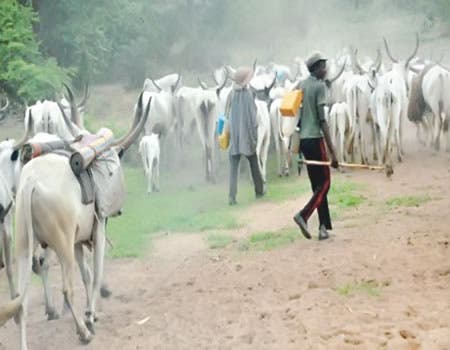
By Efe Omoghene
Rural communities across Nigeria’s Middle Belt and the North, which were once the major cities’ food pipeline, are now struggling to feed themselves. Thriving farmlands now bear the weight of fear and insecurity. With each disrupted planting season, the country edges closer to a more profound food security crisis, exacerbating what began as a regional instability into a nationwide emergency.
Incessant attacks have led to deaths and the displacement of farming communities in states that contribute significantly to Nigeria’s agricultural output. In June alone, attacks in Benue State, the “Food Basket of the Nation”, claimed dozens of lives and uprooted entire communities. While these incidents are heartbreaking, they are not new; we are only witnessing frequent recurrence. This troubling pattern of insecurity continues to force farmers off their land, disrupt food production, and weaken the nation’s ability to feed itself.Statistics from the Internal Displacement Monitoring Centre show that an estimated 295,000 internal displacements related to conflicts and violence were reported in Nigeria in 2024 alone. This includes the states of Benue, Borno, Katsina, Sokoto, Yobe and Zamfara. This is not just a crisis of safety; it’s a crisis of sustenance.For years, states such as Benue, Kaduna, Niger, Plateau, and Zamfara have been key food-producing regions, responsible for much of Nigeria’s grains, roots, fruits, and livestock. However, these areas are increasingly becoming places where violence has made farming a risky endeavour. Clashes between herders and farmers, banditry, terrorism, and communal violence have transformed fertile lands into contested zones. When farmers fear for their safety, they often cease farming or abandon their land altogether.The impact is already being felt. Markets are seeing rising prices on staple foods like yams, rice, and tomatoes. According to the National Bureau of Statistics, the cost of beans in the country in October 2024 was 282 per cent higher compared to the same period in 2023.The Food and Agriculture Organisation’s trend analysis for the north-eastern states indicates persistently high or increasing levels of food insecurity since 2018. The number of people needing urgent aid has increased by at least four million annually during the lean seasons since June 2020. Additionally, the north-west and parts of the north-central regions now exhibit critical levels of severe food insecurity and malnutrition, identifying them as major hunger hotspots requiring urgent attention from policymakers.A study revealed that 52.44 per cent of respondents in Niger State experienced food insecurity due to various insecurity activities such as blocking local routes, killings, kidnapping, and disruption of market functions. Insurgencies in the North Central states have also contributed to rising poverty levels among livestock farming households, with 83.84 per cent of livestock farmers participating in a study reporting significant declines in livestock production due to insurgency.If this pattern continues unchecked, the consequences could be long-term. More families will face hunger, and young people will leave rural areas for safety and work, draining the agricultural workforce in rural communities. Dependence on humanitarian aid will rise, and the burden on government resources will increase.This year, Nigeria is already projected to face a significant hunger gap, with up to 33 million people at risk of acute food insecurity in the lean season (between June and August), according to the FAO. This represents a seven million-person increase from the same period in 2023.Food security is not solely the government’s responsibility. It is a basic human right and our collective responsibility. Relying solely on farmers in distressed areas is not a very practical approach. Thankfully, the country is not in a hopeless situation.Across Nigeria, there are numerous examples of humanitarian and community-led peacebuilding efforts in action, and Sahel Consulting is proud to be part of this momentum. We are actively collaborating with local and international partners to develop practical solutions in the food value chain, empowering farmers and strengthening agribusinesses across Nigeria.Through our programs in dairy, seed, tuber, and policy systems, we are facilitating the increase in productivity, improving market access, and building capacity at the grassroots level. Whether it’s training dairy farmers in Adamawa, scaling clean seed yam innovations in Benue, advancing true potato seed systems in Plateau, or improving livestock nutrition through feed and fodder initiatives, our work is rooted in collaboration, innovation, and long-term impact.Similar efforts are taking shape through the work of the Gates Foundation. Gates Ag One, in partnership with the Institute for Agricultural Research at the Ahmadu Bello University, Kaduna State, is providing farmers with access to improved seed varieties for crops like beans and maize, engineered to resist pests and withstand drought. The foundation also funds projects to enhance livestock productivity and strengthen dairy value chains.State governments have also started implementing policies to support ranching to address farmer-herder conflicts and enhance agricultural productivity. Eleven states, including Anambra, Bauchi, Delta, Jigawa, Kano, Lagos, Niger, Nasarawa, Ondo, Plateau, and Zamfara, are either allocating land for ranches, developing policies, or committing to do so in the future. This initiative is part of a broader shift from open grazing to more modern, sustainable ranching practices. Farmer-herder dialogues, early warning systems, and conflict mediation groups have all demonstrated promise.Private organisations are also collaborating with ministries, agencies, and local partners to support resilient food systems through training, innovation, and market access.This is by no means the end of the story. While these efforts are commendable, their impact is not particularly noticeable vis-à-vis the insecurity, as they are implemented in isolation and on a relatively small scale. The real challenge, and opportunity, lies in collaboratively scaling initiatives that are working. For lasting change, we need to invest more in proven interventions. Government policies must be supported by robust implementation strategies, and private and development actors must be empowered to apply these models in more communities across the country.It is not enough to initiate these projects; we must establish frameworks that ensure they are sustainable, community-led, and responsive to the realities of the local communities. Clear safeguards and inclusive principles must be in place, especially in areas where displacement and land rights are already sensitive issues. Any solution must consider the voices of host communities and guarantee mutual benefit.Let’s focus on what’s already showing promise, such as improved seed distribution, inclusive value chain optimisations, and community-based peacebuilding. But let’s also be honest: we need to do much more, and we must do it together.The key is to make human security a foundation, not an afterthought, for agricultural development. Farmers need more than seeds and tools. They need to know that if they invest in their land, neither their lives nor their farms will be lost to violence; if they plant, they will live to harvest.Food security starts with human security. When fields are safe, they flourish. And when rural communities thrive, the whole country benefits—from Lagos to Maiduguri, Port Harcourt to Makurdi.Efe Omoghene is the strategic communications officer with Sahel Consulting
